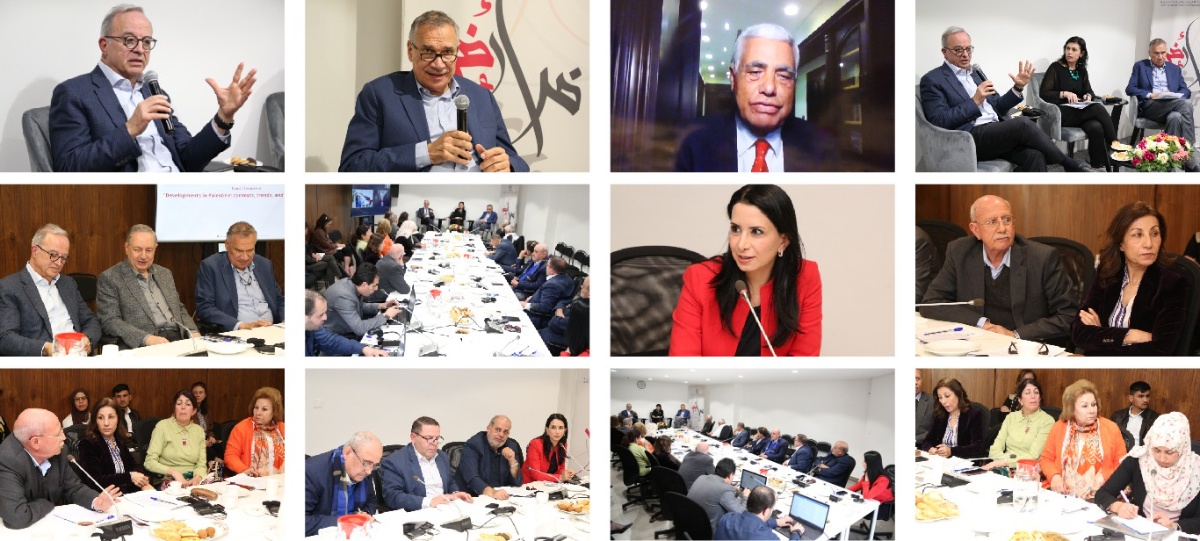In light of the recent developments in the Palestinian Cause and their impact on the Arab region as a whole, and with the escalating extremism in the Israeli discourse, in light of the violent colonial practices, especially in the West Bank, which exacerbate the existential threat to the Palestinian people, the Zionist project is currently being taken to an unprecedented level, through a series of unilateral initiatives that have resulted in a dramatic escalation of violence directed mainly at Palestinians in the West Bank so far, with dire consequences for Palestinians in the 1948 region, the Gaza Strip, and the West Bank, including East Jerusalem, as well as in the neighboring countries and beyond.
In order to reach a greater understanding of these developments, the Arab Renaissance for Democracy and Development (ARDD) held a panel discussion in the frame of the Palestinian Cause program, entitled “Developments in Palestine, Contexts, Trends, and Regional Implications”, Sunday, March 5, 2023, in the presence of a number of intellectuals, researchers, analysts, media professionals, and civil society institutions. The session was moderated by the Coordinator of Al Nahda Center, Dr. Maryam Abu Samra.
Dr. Marwan Muasher, President of the Carnegie Endowment for International Peace and former Foreign Affairs Minister of Jordan, stated that “despite the heated situation, the tendencies of the Israeli occupation state have become clear, as it does not intend to withdraw from the occupied territories nor does it intend to establish a Palestinian state,” adding that “there is a Palestinian majority in the territories controlled by the occupation, with over 7.4 million Palestinians living there, compared to 6.8 Israelis”.
Muasher stressed that the occupation state is, and has always been, an apartheid state, and that it has earned this title recently as per the legal definition, pointing out the need to use this recognition in international law forums, in order to support the just Palestinian demands, explaining that the new Palestinian generation decided to deal with the occupation through a third Palestinian intifada, which today has no leaders.
In turn, the director of the Arab Center for Research and Policy Studies in Amman, Mueen Al-Tahir, said that the prospect of reaching a settlement has become impossible, as the two-state solution and the one-state solution are not on the table, which has brought us to a standstill. He then went on to elaborate that the official Palestinian-Israeli negotiations and talks have been stalled since 2014, , stressing that the current roadmap has turned the Land-for-Peace slogan into Security-for-Peace.
He also added that “settlement expansion is the result of the policies of successive Israeli governments. Today, there are more than 12,000 settlement units in the West Bank, with settlers making up more than 25% of the population, while the number of Israelis in historical Palestine before 1948 was less than that.” In another context, he noted that the escalation of Palestinian resistance can be attributed to the fact that the post-Oslo generation carries the collective consciousness and conscience of the Palestinian people and regard Palestinian rights as their utmost concern.
For his part, Egyptian expert and writer and member of the ARDD Board of Trustees, Dr. Hasan Nafea, said that “the situation we’re in now is not surprising, as it is the result of Palestinian and Arab practices and misperceptions. Hence, we must in the future review the mistakes made by all sides, whether the Palestinian side, the Arab side, or the international system.”
He also pointed out that the risks currently target neighbouring countries, mainly Jordan, Egypt, and even Lebanon, wondering in the same context whether we are ready to rectify these mistakes and overcome the Palestinian discord, especially in light of the new generation, who believe that the rift between the factions is detrimental to the Palestinian Cause. He then stressed that the current Palestinian state of discord and division is not acceptable and should end, and that there is a need for a national movement to take charge of popular resistance in all its forms, with only one party representing the Palestinian people.
For her part, the Executive Director of ARDD, Samar Mohareb, said: “Despite all the rigidity in the occupation’s stance and the restrictions it places on the movement of Palestinians, we are meeting today to understand the contexts and trends of the Palestinian Cause, out of our recognition of its importance on the Arab arena, especially with the presence of an occupation that continues to violate, threaten, and directly jeopardize the rights of Palestinians.”
Meanwhile, extensive talks and discussions took place among the speakers, resulting in underlining the need for a radical and internal review to deal with the Palestinian Cause, at the Jordanian as well as the Arab level, and to overcome the Palestinian rift, in order to re-establish the priority of international law and strengthen the international protection of the Palestinian civilian population.
———-
Showing what is really happening on the ground is something we owe to the world and to the collective consciousness. We are happy to partner with Dialogue Edge which is supporting holding debates that discuss and showcase The Palestinian Cause, by offering their pro bono interpretation to break the language barrier thus helping reach out to a wider audience and select speakers from more diversified technical backgrounds.


